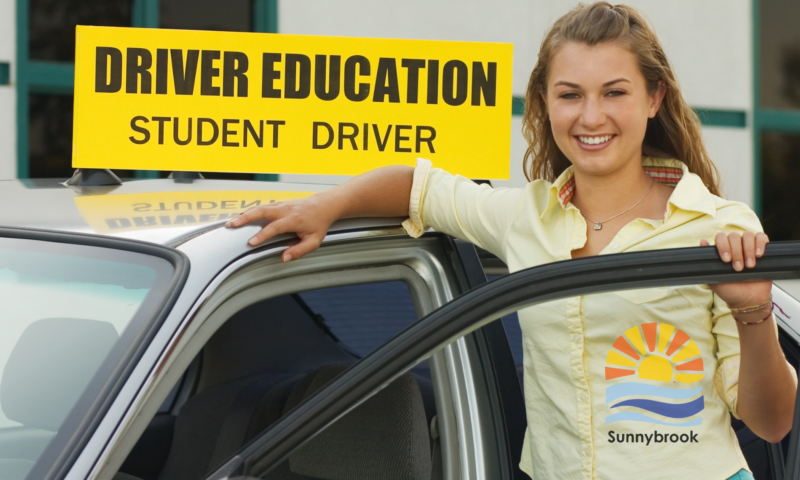Nationally, current estimates suggest that only 3% of youth in the foster system receive their Driver’s Licenses while in care. Some advocates say that very few, or none, of the young adults they speak to have gotten licenses since exiting care.
It’s a sobering reminder when you see the reports of an estimated 20,000 youth in transition exiting the foster care system each year. National statistics report that 25% are immediately homeless, 70% enter the criminal justice system within 5 years, less than 3% obtain any type of degree, 70% remain unemployed.
By comparison, 100% of all eligible Sunnybrook residents (2023 – present) have obtained their license or permit (15x the national avg), leading to an employment rate of 88% (min. 6 months on the job) and youth who are 17x more likely to purchase their first vehicle with their own cash savings! Our model is working backed by transformative outcomes.
“Behind these numbers are real stories of struggle that most people couldn’t imagine. “We’re giving [Mississippi foster youth] a foundation of faith and knowledge to unlock a fulfilling future,” said Myrle Grate, Sunnybrook Executive Director.
Let’s explore The Sunnybrook Way and its role in providing solutions to real issues plaquing our most vulnerable children in society today.
In Search of a Better Way, Building Brighter Futures
Sunnybrook recently announced two contracts awarded by the Mississippi Department of Child Protective Services (MDCPS) to provide its Driver’s Education courses to foster youth aged 15 and older.
Why is this landmark initiative, and others like it, so important to this ministry?
The youth Sunnybrook serves here on campus and foster youth across the state have no money, no employment options, no driver’s license, no education, and very little hope.
The Transportation and Driving Pilot program is the first of its kind in the state of Mississippi and serves as a collaborative partnership with local driver’s ed providers. The goal is to significantly raise the current level of foster youth who have their license, estimated at less than 5% nationally.
Common Barriers to Obtaining a License for Foster Youth
The harsh reality is that foster youth are less likely to have the support they need to obtain a learner’s permit or driver’s license. Many don’t have access to a stable adult who can teach them to drive, or they lack the funds to cover the cost of driver’s education, insurance, or even the car itself.
Without a license, their mobility is limited, which makes securing a job or attending school difficult, especially in areas where public transportation is lacking.
There are numerous, some unseen, obstacles that youth in the foster system face when seeking to obtain a license or learners permit. Some (not all) of these barriers include:
- Financial Constraints: The costs associated with driver’s education, testing, insurance, and car ownership can be prohibitive. Many foster adolescents ages 15+ simply don’t have the financial means or support from family to help cover these costs, and government or state funding for such needs is often insufficient or unavailable.
- Lack of Support Systems: While most teens learn to drive with the help of a parent or guardian, foster youth may not have consistent adults in their lives who can provide transportation to driving lessons or accompany them on the road for practice hours under adult supervision.
- Frequent Relocation: Many young adults in foster care experience frequent moves, which can disrupt their ability to complete driver’s education courses or log the required practice hours. Constant changes in foster homes or schools often lead to inconsistent support and difficulty in meeting the legal requirements for obtaining a permit or license.
- Barriers for Verification: In most states, including in Mississippi, legal documents are required as a form of verification. Acceptable documentation often includes a short list of paperwork, ID cards, or documents such as your original birth certificate, social security ID card (or number), or proof of legal identification that isn’t easily obtained or readily accessible to kids growing up in the foster care system.
Oftentimes these barriers are too tall a burden for a large majority to try to overcome, especially when void of proper guidance and lacking any real supervision from a parental figure who is committed to seeing the process through to the end.
Empowering Foster Youth Through Driver’s Education
Driving education is a vital skill for any teenager, but for youth exiting the foster care system, it is particularly crucial and often an overlooked area in the life of these young adults. Statistics show that foster youth are thrust into independence sooner than their peers at a higher rate with fewer resources and a lack of proper support.
For those foster adolescents over the age of 15, the ability to drive isn’t just about convenience—it’s a key factor in accessing employment, education, and housing opportunities, which can greatly impact their chances of successfully transitioning into adulthood.
Obtaining a driver’s license is a rite of passage for many teens, symbolizing newfound freedom and responsibility. However, for foster youth, this milestone often seems out of reach due to systemic barriers and financial constraints.
Addressing the Gaps: A Call for Action
Organizations like Sunnybrook Children’s Home, supported by grants such as the $2.1 million grant from Child Protective Services, are taking proactive steps to help bridge this gap. Programs that provide free or low-cost driver’s education courses, access to vehicles, and mentorship are crucial in empowering foster youth to gain independence.
Such initiatives not only help foster youth obtain their licenses but also teach them valuable life skills. Learning to drive instills a sense of responsibility, accountability, and confidence. Furthermore, possessing a license opens doors to employment, higher education, and social opportunities, significantly improving their quality of life.
Most importantly, this program provides our most disadvantaged, vulnerable youth HOPE for a better future. It’s a shot at building a future, which is a chance that every child deserves.
The Role of Communities and Policy
Communities, policymakers, and child welfare organizations must continue to work together to address the systemic barriers preventing foster youth from accessing driver’s education. Advocacy for policies that allow foster youth to receive driver’s education at no cost, access insurance waivers, and support from foster families or caregivers is essential.
Moreover, fostering partnerships with local businesses and organizations can provide foster youth with driving opportunities, financial support, and even access to affordable vehicles. Mentorship programs where adult volunteers help foster youth practice driving or assist them in navigating the licensing process are invaluable.
Sunnybrook’s new driver’s education program has the potential to serve as a model for similar initiatives across the country. It recognizes that fostering independence in young people is about more than just providing a roof over their heads; it’s about equipping them with the practical skills they need to succeed in the world.
A Model for the Future Puts Sunnybrook in the Driver’s Seat
By focusing on driver’s education in partnership with MDCPS, Sunnybrook is operating from a position of strength to proactively address critical needs in services gaps that have long been overlooked.
Moreover, the program’s focus on underserved youth highlights the importance of making such resources accessible to vulnerable populations statewide. In many communities, driver’s education has become a privilege rather than a right, with cost and access barriers preventing many young people from obtaining their licenses. This new program is a step toward changing that narrative, ensuring that every young person can gain this essential life skill.
As the program gets underway, it will undoubtedly make a significant difference in the lives of the youth it serves. For foster youth, in particular, the ability to drive can be a game-changer, offering them the freedom and independence they need to build a brighter future.
Thanks to this new grant, and a commitment from MDCPS, Sunnybrook is poised to make that future a reality for countless Mississippi youth as we work together to improve outcomes and break generational cycles of dependency for vulnerable foster populations across the state of Mississippi.
For more information about the Transportation and Driving Pilot Program or to get involved, please contact Ron Veazey at (601) 540-4253 or rveazey@sunnybrookms.org.

